In this post, I will be a very, very sad ExtraCareful.
Beware of Q___Q. Seriously.
In the actual game, the weirdest weapons do the most damage in the minigame. Give clothespins a bit of time and you can take off half health in one turn.
Before we get into Little Busters more in depth, let's talk about what came before - for its predecessor, Clannad, was and is the marker by what Key Studios visual novels are now compared to.
For all its hype, both in Japan and overseas, I thought that Clannad had some weak points. The characters were very likeable, don't get me wrong - Jun Maeda himself said that the plot writing and storyline in Clannad was something that he felt he would never exceed again [1]. That and the story of the development process - typical of a designs team for a game when they've hit upon creative gold - is enough to show that this visual novel was a stroke of genius, a plot that somebody pulled out at light-speed because the ideas just kept coming. However, there were some things that stuck in my mind while playing this game and also looking back at it:
1) For all its uniqueness and might, Key Studios also fell into the inevitable pitfall of seemingly isolating the main character and route heroine(s) from everyone else in the world after the route was chosen. In a sense, isolation is necessary for the specific route to develop, but Clannad takes the standard path of simply making 100 scenes where only Tomoya and the heroine is speaking. This doesn't exactly do wonders for engagement in the world of Clannad as opposed to simply the storyline of Clannad. Taken to the extreme, it reads like a piece of 19th century British romantic literature where the characters are simply throwing lines at each other and hoping it lands.
2) The lights. The wonder. The magic. Again, as mentioned in the interviews with the developers, this Key VN also had some problems with mixing the supernatural elements with the slice-of-life. The anime adaptation does it slightly better, but in either case the "magical snow land" and the "lights of the city" tend to be incoherent plot devices that are sporadically mentioned and only really important for making sure Nagisa comes back to life. With regards to this, the sense of wonder that I got from seeing pretty lights in random places (besides making me think that I required anti-hallucinogenics) was about as deep as a shock scare from Ju-on: The Grudge.
I mean, c'mon. If you were planning to turn the lights that you obtain throughout the game into usable items along with inventory [2], you clearly weren't thinking too hard about the integration of the supernatural into the rest of the story (although Jun Maeda kept trying - one of which ended up becoming Angel Beats!)
3) A lack of substance between major "event" scenes. An event scene is, for me, a scene containing some significant event or development that can be seen independently and not as a transition to something else. One example might be the gym scene the Tomoya and Kyou, or the juice scene with Fuuko. Clannad had fantastic event scenes, classics that will be floating around YouTube until time immemorial. I will never argue that Clannad has boring event scenes. The anime adaptation showed them off quite well, actually, simply by parading them in front of the viewers one-by-one (a lunch scene, a fight scene, the motorcycle incident, the fights with Tomoyo, etc etc...) However, in my opinion, the fact that the anime truncated the storyline to such an extent improved the overall flow.
Take for example the Kyou/Ryou route (since Kyou is my favorite heroine there anyways). Although the common route/common scenes are mainly covered in the first anime adaptation season, it still surprises some people that at least half of the scenes specific to the route are just stuffed into one OVA. What's even more magical is that they manage to actually cover all the important bits and do it well. How did this work? Well, for anyone who's actually played the visual novel, they'd know that the majority of the story that's NOT included in the OVA simply consists of sitting down and enjoying some nice lunchtime with Ryou and Kyou (mainly Ryou). I think I can handle slow slice-of-life pacing pretty well, but after 7-8 game days of having lunch where the majority of the lines are "...is it tasty?" and "...", even I was getting tired. I mean, I ate the living shit out of Ryou's lunchbox, but I needed something more. Although in the anime these lulls were truncated to a great extent, I still feel that Clannad was much more episodic when the current arc stopped being relevant to Nagisa.
Let me make this clear: Clannad is still a very good series to me, even without the nostalgic lens. It is one of the classics that truly delivers the power of slice-of-life, fully bundled and decorated by the Key+KyoAni powerhouse combination. But I think in retrospect, looking at it objectively (even relative to contemporary series), Clannad shows a few flaws evident throughout the series and its predecessors.
I think Little Busters! (and Rewrite too, but fuck Rewrite) fixes those flaws rather nicely. Although many of the individual endings do indeed involve simply the protagonist (Naoe Riki) and the girl, the arcs themselves are interwoven heavily with the common arc as well as interactions with other people from the cast. Furthermore, the central, driving plot is based not around any one interaction, but rather the entire cast and the evolution of the protagonist. This, I feel, is much more ambitious than Clannad ever was simply due to the fact that it's not just a slice-of-life, but something more focused around a theme (or preachy, depending on how cynical you wish to be). This theme of "adolescence" and "everyday friendship" and "changing times" really helps with the flow of the visual novel, as special events are more or less based around wacky everyday occurrences.
Unlike in Clannad, where scenes range from "sunset fighting scene" to "Kotomi's violin concert" to "flashback flashback flashback flashback" events that are interesting due to the fact that they are out of place in everyday life, Little Busters has simple scenes such as newspaper sword fights and baseball game training that is interesting because you are forced to relish the simplicity of such events. It's not an isolated chain of interesting events that make a slice-of-life good, Little Busters states. It's the continuum of everyday life, the fact that you can enjoy such small things like this without worrying too hard about the future. It's the abstraction of these small pleasures and the menial details of life that really characterize a slice-of-life (regardless of how ideal the background/setup is), and in this sense, Little Busters is a more "true" slice-of-life - something I can really relax and chew on for a bit.
Finally, the magic in Clannad is most definitely refined and fixed in Little Busters. This time, the sparkling lights aren't hiding in the background - they're in your face, affecting individual arcs and the central plot. In fact, the plot is explicitly based on supernatural events. This "coming out of the closet" by Key studios was probably one of the best things to happen to the development of this line of visual novels, since now the plot is able to explain the magic and vice versa. This is also how the later Angel Beats was made and it's clear that this formula works better than forcing the supernatural theme to lurk in the shadows all the time. It adds more coherency to the core and the conclusion of the story, something that Clannad was sorely in need of. By using this available magic instead of dozing off to a winter wonderland every time, Little Busters is able to go out with a bang.
So this being said, although Clannad is clearly the flagship of Key, I firmly back Little Busters as the pinnacle of their creative efforts (Note: I have completed two Rewrite routes. Fuck that shit.) So what does this mean? It means that the anime adaptation should have been at least a heavy contender for the "Series of the Year" award. It should have rocked my sensibilities in a way that only two or three series these past years have done for me. It should have made me crawl in a hole, bruised and wounded by the amount of feels pounding onto me.
What happened instead? KyoAni decided to release Chuunibyou, Demo Koi ga Shitai! and Tamako Market while J.C. Staff took over Little Busters! under the direction of Yamakawa Yoshiki, who has done NO other mainstream/famous slice-of-life series, NO previous Key studio adaptations, and the closest he has come to slice-of-life is helping with a small portion of the storyboard/key animation with Azumangah Daiou and Kaichou wa Maid-sama (and the main script director of Little Busters! isn't much better off). That's right - not one, but two half-baked 12-episode series was created by KyoAni and directed under Ishihara Tatsuya, who rightfully SHOULD have directed the next Key/KyoAni adaptation, all while Little Busters was manhandled by J.C. Staff.
Why, KyoAni? WHY? This was certainly going to be the next big thing. Why wasn't it picked up? Were you afraid, perhaps, of the commercial failures of Little Busters? Was the lucrative payoff of Clannad not enough for you to quickly contract with Key for the rights, no matter how big it might have been? I mean, Jesus, Key Studios is STILL releasing soundtrack remix albums from time to time and people lap that shit up. How hard could Little Busters be to sell?
And now J.C. Staff has trampled all over what could have been a classic series. How? Here's the list:
- They rushed the pacing to fit in individual arcs, but did it at the cost of randomly truncating important plot motives and thus de-dramatizing the arc. Furthermore, rushing these arcs at a completely arbitrary pace made each and every heroine seem irrelevant on their own.
- Rin's evolution as a character, almost as supremely important as Riki's in the visual novel, is extremely damped down in the adaptation. The chasing of the cats and the events that follow seem useless, especially with the lack of foreshadowing.
- The adaptation tried to really emphasize the Little Busters as a team working together to solve the problems of everyone involved, which is a unique spin on the series and something that I respect the studio for trying. However, in trying to balance this with the plot of the series (see next point), it fell flat on its face. The adaptation then responded by just taking the lazy way out and concluded every individual arc with an almost facetious "let's everybody contribute a little something to help out person A" or "everybody shout, 'I BELIEVE IN YOU!'" ending. This was repetitive and really disappointing for a unique attempt.
- The problem with doing the above is that one of the main points of Little Busters is the evolution of Riki. Riki grows stronger and stronger and learns from all his experiences with dealing with the members of the Little Busters as well as his own obstacles. Not only is this not handled well with the competing interest of "have the entire cast evolve one step at a time" sort of plot development, J.C. Staff actually de-emphasizes the evolution of Riki, only mentioning it at the last second of the series (blah blah blah exposition flashback I want to become as strong as Kyosuke blah blah blah). You know the series is knee-deep in shit when one of the central pillars of the series is only half-heartedly mentioned in the conclusion.
- Finally, it's all so mellow. Little Busters the visual novel, for all its slice-of-life glory, is really not mellow. It's crazy interactions/small tangents, then introspection, then crazy shit, then introspection, then the Little Busters team unites and the cycle repeats all over again. None of that really happens in the adaptation. I didn't feel anything when Komari cries, and especially not when Riki feeds her a Max Revive in a space of maybe five minutes. I didn't feel anything when Haruka rages. I didn't feel anything when shit happens to Kud, but when I was playing through the visual novel, I had one hand over my mouth going "ohshitohshitohshitohshit" as I concluded her arc. What happened to all of the tension?
I hoped it would be better. Every week I sat down and told myself, "the next arc will be better." Every week I stared at those rounded-out faces and pastel colors as the plot drove itself into the ground and fractured in every which direction. And every week, I cursed the fact that KyoAni and Ishihara Tatsuya did not turn Little Busters into the masterpiece it rightfully deserved to be. And now, we have this mediocre piece of an anime adaptation that casual watchers will look at and never think to play the visual novel that really has the ability to blow Clannad out of the water.
And it's not like Chuunibyou and Tamako Market are huge successes either. They're nice, to be certain, but Chuunibyou is much more of a standard rom-com that a studio such as, I don't know, A-1 Pictures or J.C. STAFF might have done and done just as well, while Tamako Market's first half was clearly unpolished and lacked decent pacing. And yet...they gave up Little Busters for these two series?
I'm disappointed. I'm angry. I'm confused. But most of all, I'm really sad. Something great - something that could have risen from the pile of mediocrity that we call anime seasons nowadays - something that could have had reviewers absolutely foam at the mouth as never before since Clannad - has instead been turned into another stale series, doomed to be forgotten instead of being enshrined. And I just watched it die a slow death.
For all its hype, both in Japan and overseas, I thought that Clannad had some weak points. The characters were very likeable, don't get me wrong - Jun Maeda himself said that the plot writing and storyline in Clannad was something that he felt he would never exceed again [1]. That and the story of the development process - typical of a designs team for a game when they've hit upon creative gold - is enough to show that this visual novel was a stroke of genius, a plot that somebody pulled out at light-speed because the ideas just kept coming. However, there were some things that stuck in my mind while playing this game and also looking back at it:
1) For all its uniqueness and might, Key Studios also fell into the inevitable pitfall of seemingly isolating the main character and route heroine(s) from everyone else in the world after the route was chosen. In a sense, isolation is necessary for the specific route to develop, but Clannad takes the standard path of simply making 100 scenes where only Tomoya and the heroine is speaking. This doesn't exactly do wonders for engagement in the world of Clannad as opposed to simply the storyline of Clannad. Taken to the extreme, it reads like a piece of 19th century British romantic literature where the characters are simply throwing lines at each other and hoping it lands.
2) The lights. The wonder. The magic. Again, as mentioned in the interviews with the developers, this Key VN also had some problems with mixing the supernatural elements with the slice-of-life. The anime adaptation does it slightly better, but in either case the "magical snow land" and the "lights of the city" tend to be incoherent plot devices that are sporadically mentioned and only really important for making sure Nagisa comes back to life. With regards to this, the sense of wonder that I got from seeing pretty lights in random places (besides making me think that I required anti-hallucinogenics) was about as deep as a shock scare from Ju-on: The Grudge.
You better like staring at snowfields, because this usually takes up half of every other episode.
I mean, c'mon. If you were planning to turn the lights that you obtain throughout the game into usable items along with inventory [2], you clearly weren't thinking too hard about the integration of the supernatural into the rest of the story (although Jun Maeda kept trying - one of which ended up becoming Angel Beats!)
3) A lack of substance between major "event" scenes. An event scene is, for me, a scene containing some significant event or development that can be seen independently and not as a transition to something else. One example might be the gym scene the Tomoya and Kyou, or the juice scene with Fuuko. Clannad had fantastic event scenes, classics that will be floating around YouTube until time immemorial. I will never argue that Clannad has boring event scenes. The anime adaptation showed them off quite well, actually, simply by parading them in front of the viewers one-by-one (a lunch scene, a fight scene, the motorcycle incident, the fights with Tomoyo, etc etc...) However, in my opinion, the fact that the anime truncated the storyline to such an extent improved the overall flow.
Take for example the Kyou/Ryou route (since Kyou is my favorite heroine there anyways). Although the common route/common scenes are mainly covered in the first anime adaptation season, it still surprises some people that at least half of the scenes specific to the route are just stuffed into one OVA. What's even more magical is that they manage to actually cover all the important bits and do it well. How did this work? Well, for anyone who's actually played the visual novel, they'd know that the majority of the story that's NOT included in the OVA simply consists of sitting down and enjoying some nice lunchtime with Ryou and Kyou (mainly Ryou). I think I can handle slow slice-of-life pacing pretty well, but after 7-8 game days of having lunch where the majority of the lines are "...is it tasty?" and "...", even I was getting tired. I mean, I ate the living shit out of Ryou's lunchbox, but I needed something more. Although in the anime these lulls were truncated to a great extent, I still feel that Clannad was much more episodic when the current arc stopped being relevant to Nagisa.
Welcome to every day for the rest of your life
Let me make this clear: Clannad is still a very good series to me, even without the nostalgic lens. It is one of the classics that truly delivers the power of slice-of-life, fully bundled and decorated by the Key+KyoAni powerhouse combination. But I think in retrospect, looking at it objectively (even relative to contemporary series), Clannad shows a few flaws evident throughout the series and its predecessors.
I think Little Busters! (and Rewrite too, but fuck Rewrite) fixes those flaws rather nicely. Although many of the individual endings do indeed involve simply the protagonist (Naoe Riki) and the girl, the arcs themselves are interwoven heavily with the common arc as well as interactions with other people from the cast. Furthermore, the central, driving plot is based not around any one interaction, but rather the entire cast and the evolution of the protagonist. This, I feel, is much more ambitious than Clannad ever was simply due to the fact that it's not just a slice-of-life, but something more focused around a theme (or preachy, depending on how cynical you wish to be). This theme of "adolescence" and "everyday friendship" and "changing times" really helps with the flow of the visual novel, as special events are more or less based around wacky everyday occurrences.
Unlike in Clannad, where scenes range from "sunset fighting scene" to "Kotomi's violin concert" to "flashback flashback flashback flashback" events that are interesting due to the fact that they are out of place in everyday life, Little Busters has simple scenes such as newspaper sword fights and baseball game training that is interesting because you are forced to relish the simplicity of such events. It's not an isolated chain of interesting events that make a slice-of-life good, Little Busters states. It's the continuum of everyday life, the fact that you can enjoy such small things like this without worrying too hard about the future. It's the abstraction of these small pleasures and the menial details of life that really characterize a slice-of-life (regardless of how ideal the background/setup is), and in this sense, Little Busters is a more "true" slice-of-life - something I can really relax and chew on for a bit.
Everyday occurrences
Finally, the magic in Clannad is most definitely refined and fixed in Little Busters. This time, the sparkling lights aren't hiding in the background - they're in your face, affecting individual arcs and the central plot. In fact, the plot is explicitly based on supernatural events. This "coming out of the closet" by Key studios was probably one of the best things to happen to the development of this line of visual novels, since now the plot is able to explain the magic and vice versa. This is also how the later Angel Beats was made and it's clear that this formula works better than forcing the supernatural theme to lurk in the shadows all the time. It adds more coherency to the core and the conclusion of the story, something that Clannad was sorely in need of. By using this available magic instead of dozing off to a winter wonderland every time, Little Busters is able to go out with a bang.
So this being said, although Clannad is clearly the flagship of Key, I firmly back Little Busters as the pinnacle of their creative efforts (Note: I have completed two Rewrite routes. Fuck that shit.) So what does this mean? It means that the anime adaptation should have been at least a heavy contender for the "Series of the Year" award. It should have rocked my sensibilities in a way that only two or three series these past years have done for me. It should have made me crawl in a hole, bruised and wounded by the amount of feels pounding onto me.
What happened instead? KyoAni decided to release Chuunibyou, Demo Koi ga Shitai! and Tamako Market while J.C. Staff took over Little Busters! under the direction of Yamakawa Yoshiki, who has done NO other mainstream/famous slice-of-life series, NO previous Key studio adaptations, and the closest he has come to slice-of-life is helping with a small portion of the storyboard/key animation with Azumangah Daiou and Kaichou wa Maid-sama (and the main script director of Little Busters! isn't much better off). That's right - not one, but two half-baked 12-episode series was created by KyoAni and directed under Ishihara Tatsuya, who rightfully SHOULD have directed the next Key/KyoAni adaptation, all while Little Busters was manhandled by J.C. Staff.
This is what Little Busters season two is going to look like
Why, KyoAni? WHY? This was certainly going to be the next big thing. Why wasn't it picked up? Were you afraid, perhaps, of the commercial failures of Little Busters? Was the lucrative payoff of Clannad not enough for you to quickly contract with Key for the rights, no matter how big it might have been? I mean, Jesus, Key Studios is STILL releasing soundtrack remix albums from time to time and people lap that shit up. How hard could Little Busters be to sell?
And now J.C. Staff has trampled all over what could have been a classic series. How? Here's the list:
- They rushed the pacing to fit in individual arcs, but did it at the cost of randomly truncating important plot motives and thus de-dramatizing the arc. Furthermore, rushing these arcs at a completely arbitrary pace made each and every heroine seem irrelevant on their own.
- Rin's evolution as a character, almost as supremely important as Riki's in the visual novel, is extremely damped down in the adaptation. The chasing of the cats and the events that follow seem useless, especially with the lack of foreshadowing.
Oh shit! Cats!
- The adaptation tried to really emphasize the Little Busters as a team working together to solve the problems of everyone involved, which is a unique spin on the series and something that I respect the studio for trying. However, in trying to balance this with the plot of the series (see next point), it fell flat on its face. The adaptation then responded by just taking the lazy way out and concluded every individual arc with an almost facetious "let's everybody contribute a little something to help out person A" or "everybody shout, 'I BELIEVE IN YOU!'" ending. This was repetitive and really disappointing for a unique attempt.
- The problem with doing the above is that one of the main points of Little Busters is the evolution of Riki. Riki grows stronger and stronger and learns from all his experiences with dealing with the members of the Little Busters as well as his own obstacles. Not only is this not handled well with the competing interest of "have the entire cast evolve one step at a time" sort of plot development, J.C. Staff actually de-emphasizes the evolution of Riki, only mentioning it at the last second of the series (blah blah blah exposition flashback I want to become as strong as Kyosuke blah blah blah). You know the series is knee-deep in shit when one of the central pillars of the series is only half-heartedly mentioned in the conclusion.
- Finally, it's all so mellow. Little Busters the visual novel, for all its slice-of-life glory, is really not mellow. It's crazy interactions/small tangents, then introspection, then crazy shit, then introspection, then the Little Busters team unites and the cycle repeats all over again. None of that really happens in the adaptation. I didn't feel anything when Komari cries, and especially not when Riki feeds her a Max Revive in a space of maybe five minutes. I didn't feel anything when Haruka rages. I didn't feel anything when shit happens to Kud, but when I was playing through the visual novel, I had one hand over my mouth going "ohshitohshitohshitohshit" as I concluded her arc. What happened to all of the tension?
I hoped it would be better. Every week I sat down and told myself, "the next arc will be better." Every week I stared at those rounded-out faces and pastel colors as the plot drove itself into the ground and fractured in every which direction. And every week, I cursed the fact that KyoAni and Ishihara Tatsuya did not turn Little Busters into the masterpiece it rightfully deserved to be. And now, we have this mediocre piece of an anime adaptation that casual watchers will look at and never think to play the visual novel that really has the ability to blow Clannad out of the water.
And it's not like Chuunibyou and Tamako Market are huge successes either. They're nice, to be certain, but Chuunibyou is much more of a standard rom-com that a studio such as, I don't know, A-1 Pictures or J.C. STAFF might have done and done just as well, while Tamako Market's first half was clearly unpolished and lacked decent pacing. And yet...they gave up Little Busters for these two series?
I'm disappointed. I'm angry. I'm confused. But most of all, I'm really sad. Something great - something that could have risen from the pile of mediocrity that we call anime seasons nowadays - something that could have had reviewers absolutely foam at the mouth as never before since Clannad - has instead been turned into another stale series, doomed to be forgotten instead of being enshrined. And I just watched it die a slow death.
FUCK YOU
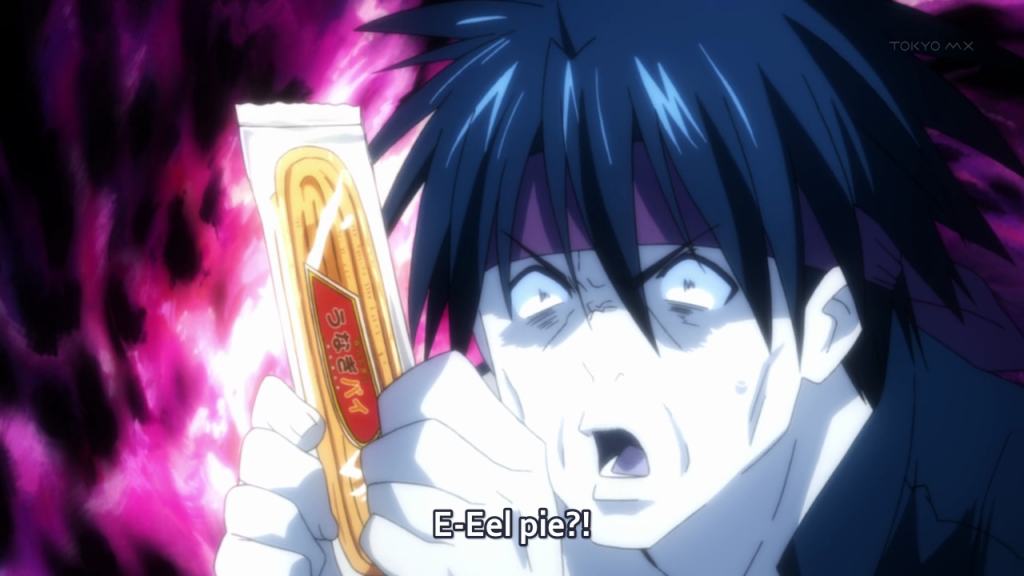


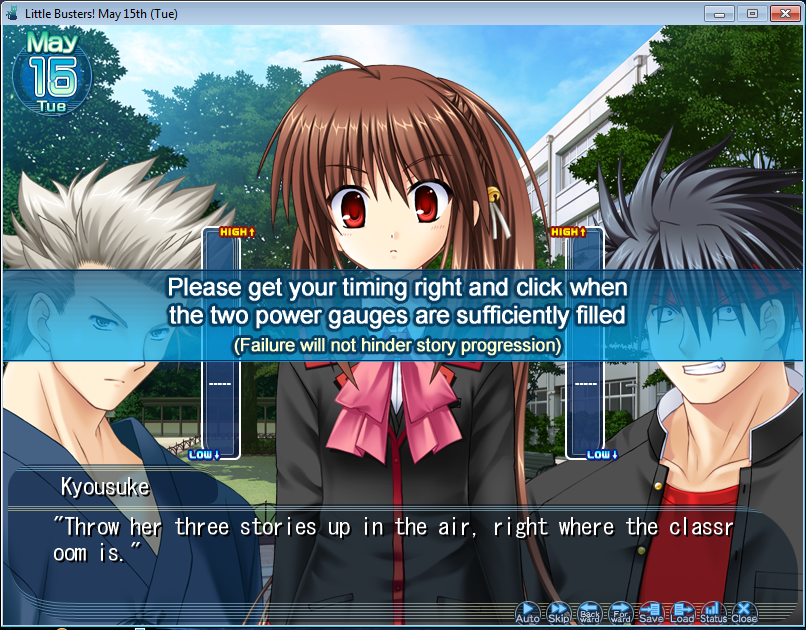

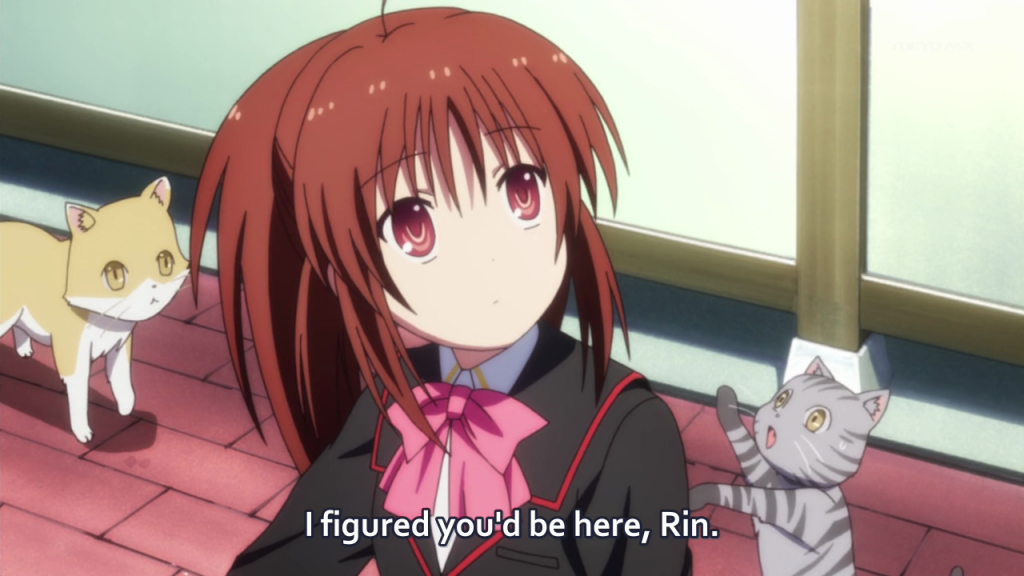
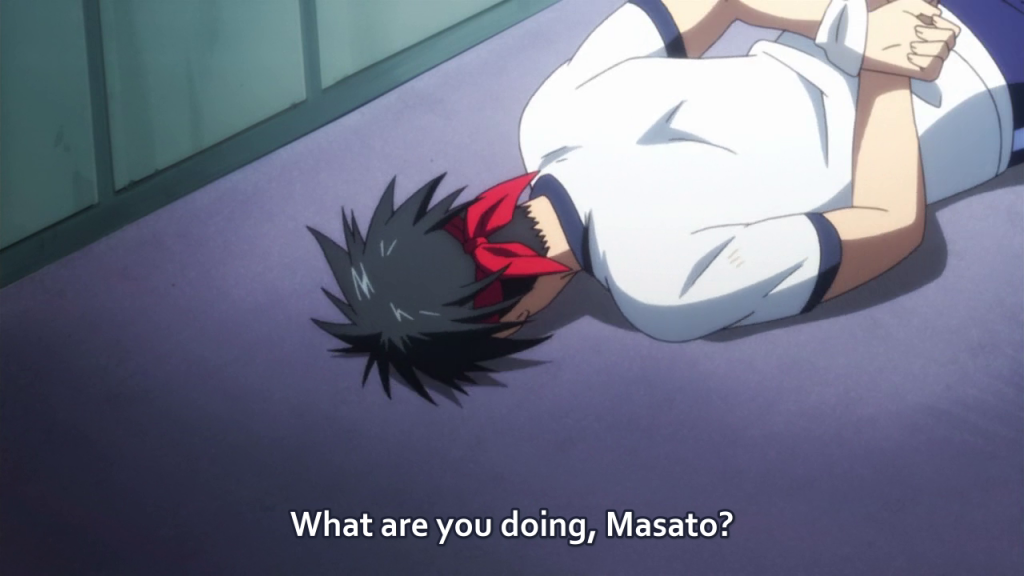
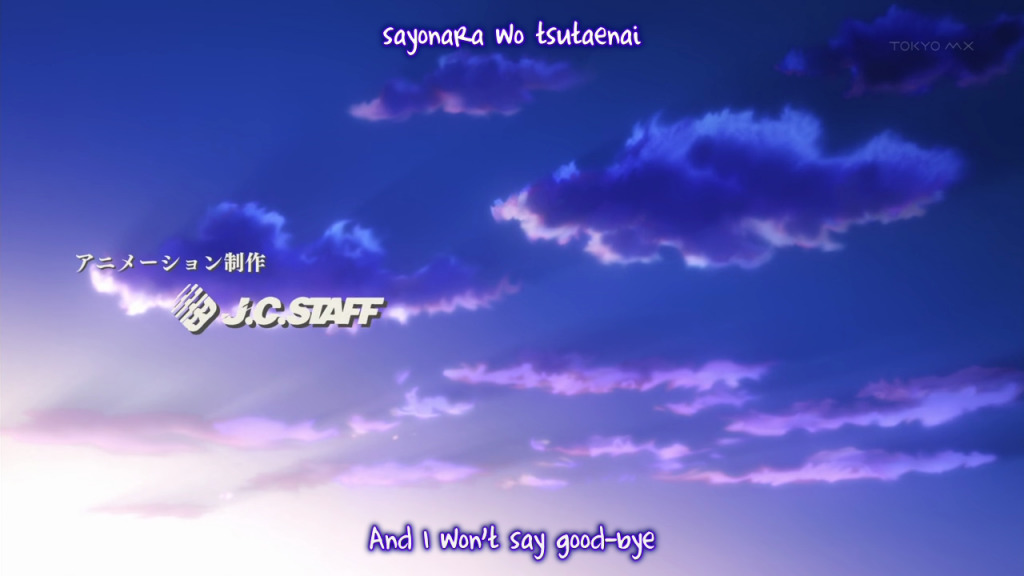
I disagree with all of these statements. This is a sports anime about baseball and the difficulties of the team to make it to the nation top. What is this about paths and routes...
ReplyDeleteAs such a comparison to Clannad or Addclan is preposterous
Well said. Clannad truly was a great anime even though the source had its flaws. They really did a great job directing it. It really is unfortunate that KyoAni couldnt realize the goldmine they were sitting on with Little Busters. Sure the whole "restart from the beginning" gimmick might have been hard to adapt, but thats where creativity comes in. The game was great but such a obviously half assed attempt at what people call anime is horrible. Sigh i knew this would happen when JC Staff was handed Little Busters. And I have to say in complete agreement
ReplyDeleteFuck you JC Staff